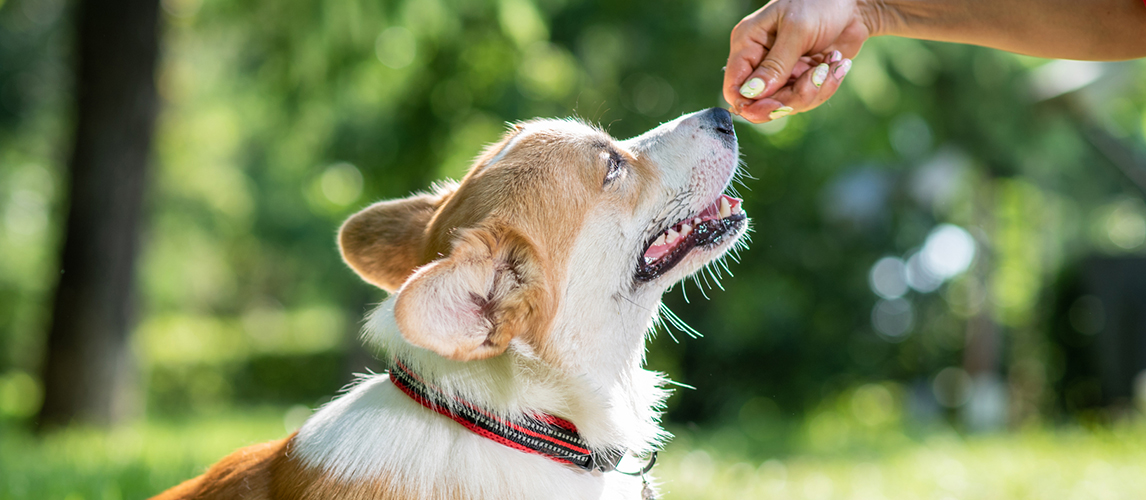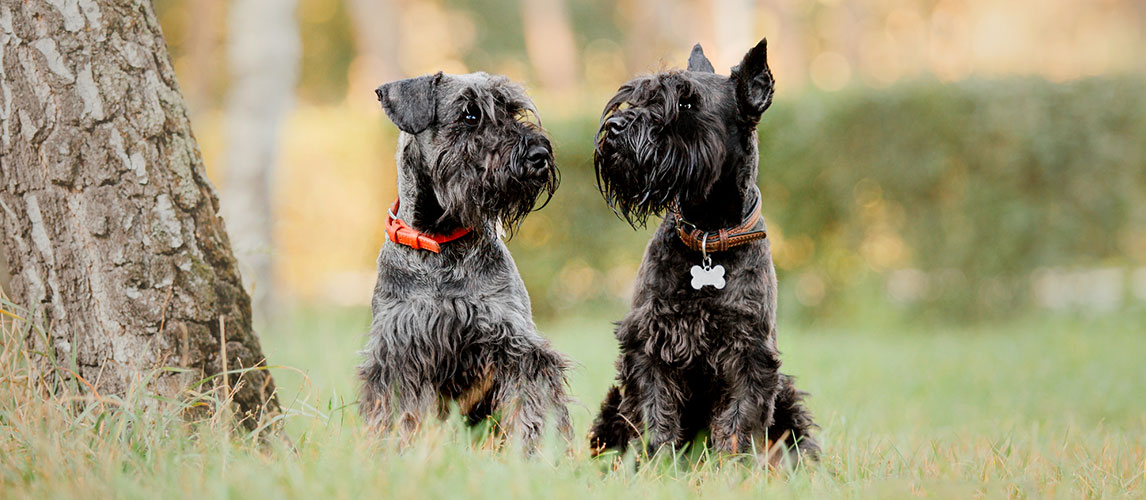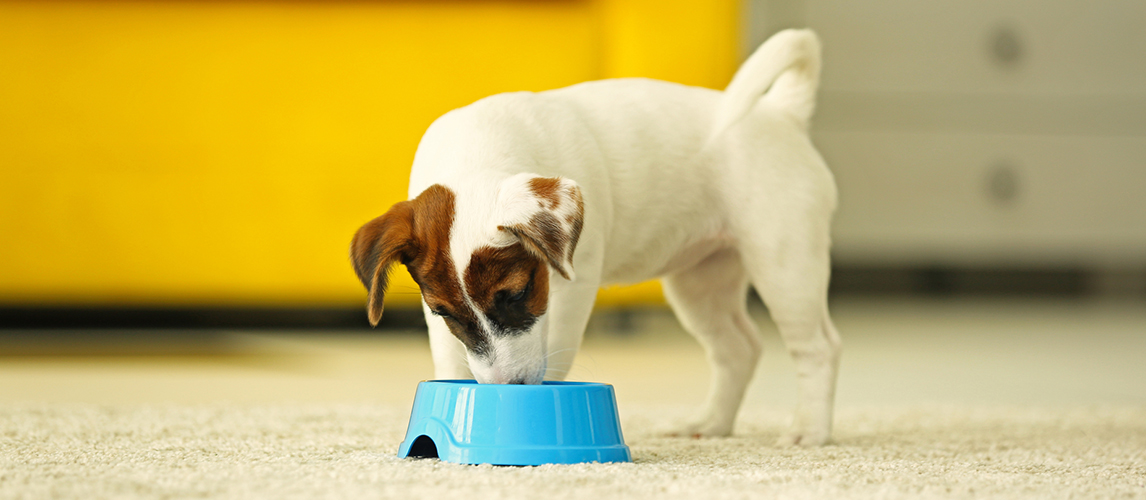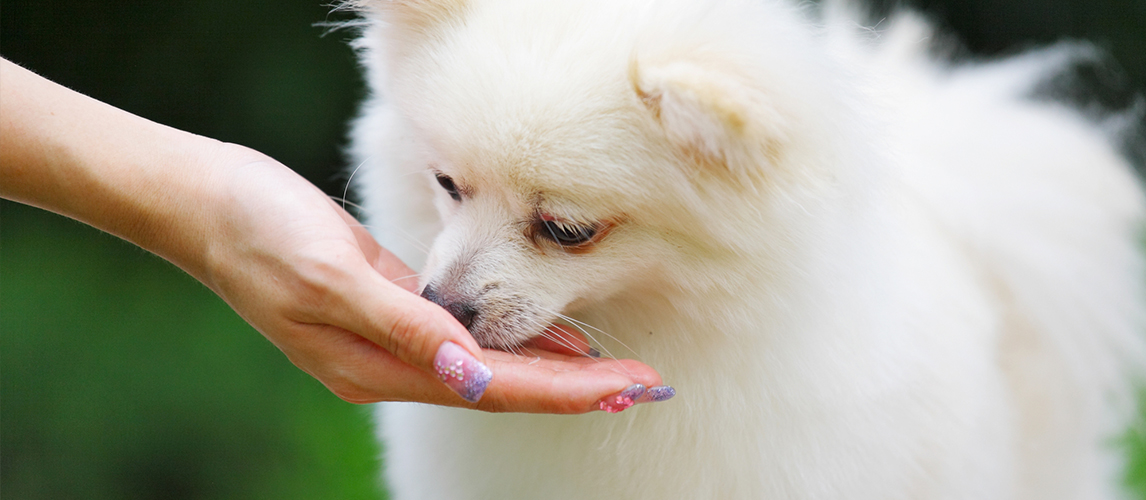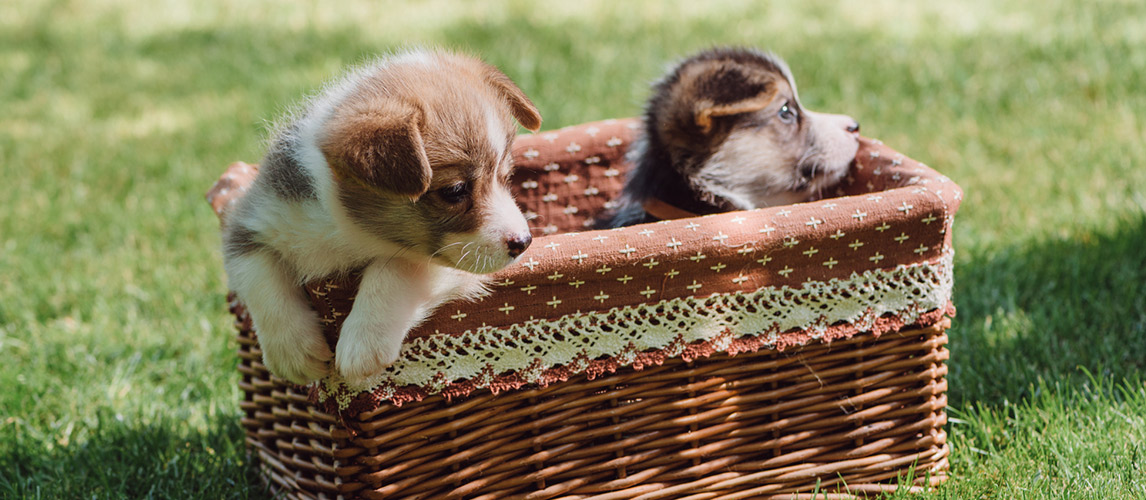Many human foods are perfectly safe for dogs, but some are very dangerous. Eating the wrong foods can lead to long-term health problems and, in extreme cases, even death. As carnivores, the occasional fruit or veggie as a treat is OK, but knowing the dangers of feeding your dog the wrong one could be a lifesaver. Read on to find out which fruits and vegetables for dogs are safe for sharing in moderation and which are dangerous for dogs to eat.
Can Dogs Eat Vegetables?
Absolutely. When you look at the ingredient list for most dog food you’ll likely find at least one vegetable in the mix to fill out the flavor pallet, balance the nutrition, and provide a range of additional health benefits. Dog-friendly vegetables are as much a part of a balanced diet for canines as they are for humans. The right veg is particularly helpful as an alternative healthy treat choice for overweight dogs, to give a bigger pup the chance to lose weight without feeling deprived of the joy of tasty snacks.
Though it is worth noting that not all vegetables are suitable for canine consumption. In fact, letting your dog eat the wrong vegetable could have nasty consequences. So familiarizing yourself with the fruits and veggies that are best suited to your dog’s digestion will save you both a lot of hassle.
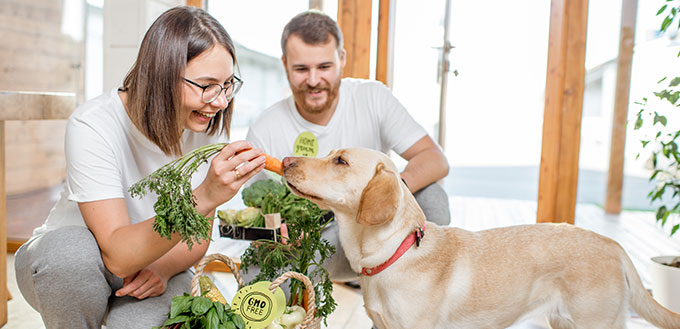
What Veggies Can Dogs Eat
Here we have put together an easy guide to the best vegetables for dogs and what makes them worth including in your dog’s diet.
Carrots
Carrots are easily at the top of our list for vegetables dogs can eat. Carrots are high in fiber, low in calories, a good source of beta-carotene and vitamin A. Their extra crunchiness also makes carrots good for your dog’s teeth. Carrots contain vitamin A, biotin, vitamin K, potassium, vitamin B6, and vitamin B2. Additionally, if your dog is struggling with loose stools, the high fiber content in carrots can help to alleviate the problem, making them top of the list of dog-friendly vegetables.
Green Beans
Among the veggies dogs can eat are green beans. Green beans are a good source of protein and iron for cats and dogs alike. Fresh, frozen, sodium-free green beans can make a healthy snack that keeps pets slim and lean. They’re low-calorie and rich in fiber, vitamins A, C & K, and vitamins B6, BC. Green beans can be eaten as treats for training purposes and can be added to your dog’s meal as a little sweet crunch of flavor. Green beans will likely be a refreshing change of pace for your pup.
Celery
Celery is a great source of vitamins A, B, C, calcium, potassium, iron, sodium, and phosphorus. It doesn’t get much simpler than washing and chopping up celery. It also has a high water content that has been shown to help freshen your pet’s breath. Additionally, celery benefits also include antioxidants that will help keep your dog feeling young and healthy. Just like carrots, celery makes a fun snack for your dog to crunch down on in its stick form – much like a dentastix treat but better.
Bell Peppers
Like anything, bell peppers are best used in moderation alongside a balanced diet. However, they are perfectly healthy for dogs to eat. They are chock full of vitamins such as vitamin A, B, and C as well as containing ellagic acid and antioxidants. The Beta-carotene in Vitamin A is great for promoting your dog’s eye health, whilst the ellagic acid, antioxidants, and vitamin B are believed to help fight cancer in canines. Just slice the pepper into strips for the perfect healthy treat.
Cucumber
Many dogs benefit from cucumbers thanks to their breath freshening properties and hydrating water content. They contain little fats and carbohydrates, making cucumbers a great low-calorie treat for a pup dog that might struggle with its weight. Additionally, cucumbers can help to lower your pup’s blood pressure and cholesterol, which is especially helpful for dogs in their senior years. Cucumbers also work well chopped down into small pieces and mixed in with your dog’s food.
Broccoli
Though broccoli can be very healthy for your dog, it is most beneficial when prepared correctly. Ideally, you want to give your pooch the broccoli florets without the stems. Vitamin C, vitamin B, and potassium are all included in broccoli which can help to improve your dog’s bone density, strengthen their immune system and support a healthy heart. Like many fruits and vegetables, broccoli can be a great treat for your pup – but you must feed it to your pooch in moderation.
Sweet Potatoes
Sweet potato is a classic ingredient across a wide range of dog food. Sweet potatoes provide carbohydrates and a kick of flavor that standard potatoes can’t match. Many dogs thoroughly enjoy sweet potatoes as tasty snacks when chopped and boiled. Additionally, the high fiber content help to keep your dog regular, whilst the manganese and potassium help to strengthen their bones. Sweet potatoes are also an excellent source of vitamins A, B5, B6, and C. They can be served boiled (never raw) and mixed into your dog’s food, or dehydrated as bite-sized chew.
Brussels Sprouts
Brussel sprouts can be a yummy change in your dog’s diet, (when fully cooked, not raw) but might not be something you’ll want to give them on the regular! Brussel sprouts are stuffed with antioxidants that can strengthen your dog’s immune system and keep them fighting fit, like any fruits and veggies. However, they have one fatal flaw – gas. Both unpleasant for you and likely for your pooch as well, Brussel sprouts can produce a lot of gas if you’re too liberal, so considering yourself warned.
Cabbage
Both cooked and raw cabbage is also perfectly fine for your pup. Red and green cabbage are equally healthy, with important vitamins like vitamins C, B6, K, and B9 which aid digestive health, help to regulate blood sugar levels, and reduce the risk of osteoporosis. Additionally, cabbage contains calcium for good bone health and magnesium to help support mental development in puppies. But once again, cabbage comes with the same gas warning as Brussel sprouts, so be light with the servings.
Read here our detailed article on Can Dogs Eat Cabbage.
Peas
Peas in almost every form, snow peas, sugar snap peas, green peas, English peas, and garden peas are all fine for your dog to eat. You can also feed your dog fresh peas or frozen if you prefer. Whilst they may not be ideal for individual treats (unless they’re sugar snap peas), they can certainly help to brighten a bowl of food. Peas are known for being rich in protein, high in fiber, and packed with minerals, nutrients, vitamins. However, you should avoid canned peas as they can have added sodium.
Spinach
Spinach is perfectly fine for your puppy to eat, as it is filled with vitamins and minerals and has a low salt content. However, of all the fruits and veggies on our list, spinach is probably one of the ones that is less beneficial to your puppy, especially in large amounts. The oxalic acid content in spinach can stop your dog’s body from absorbing calcium properly, which could result in kidney problems. And whilst it would take a lot of spinach to do that, you might as well just pick one of the other veggies instead.
Potatoes
A classic ingredient in a wide range of dog foods, for a sense source carbohydrates, to help fuel your dog’s lifestyle. Potatoes are definitely perfect fine for your dog to eat – cooked not raw. Be them boiled in bite-sized pieces or baked in slices, potatoes can make the perfect snack between meals to hold your dog’s appetite until dinner time. They’re a great source of iron, vitamin C, potassium, and vitamin B6, which is great for red blood cell formation.
Corn
Corn is actually a very common ingredient in many dog foods and so it is perfectly safe for them to eat. However, we wouldn’t suggest giving your dog the cob as it can be difficult for them to digest. Which can consequently lead to intestinal blockage. So it’s best to serve their corn off the cob instead.
Cauliflower
Much like with broccoli dogs can eat cauliflower, you just need to know how best to serve it. Cauliflower contains vitamin K, vitamin C, vitamin B, folate, calcium, potassium, fiber, and sulforaphane. Which, when combined, assist with maintaining good blood pressure, healthy skin and coat, bone strength, healthy digestion, and a stronger immune system. Just be mindful that cauliflower needs to be fully cooked, especially if you’re planning on giving it to your pup with the stem attached, which is extremely tough when raw. Also, cauliflower is knows to cause gas if dogs are given to much, so try to use it in moderation with their standard diet.
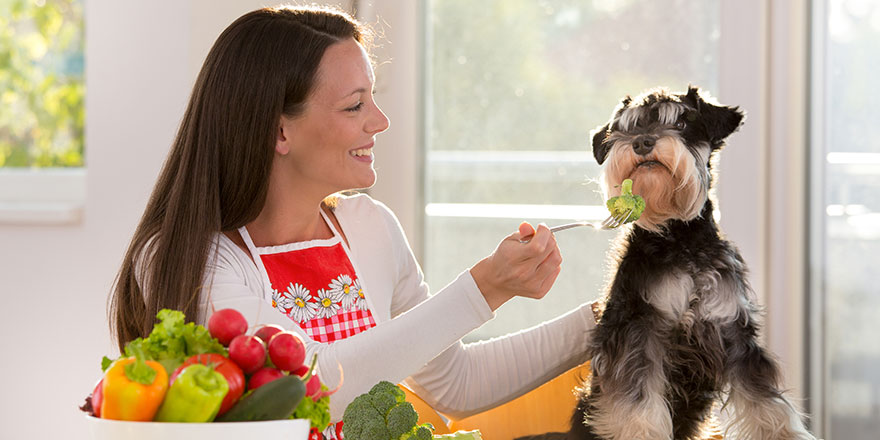
Vegetables Dogs Can’t Eat
There are not many veggies dogs can’t eat. However, one or two of them are particularly common in most households and so have a higher possibility of being accidentally eaten by your pup. Be it because of the lack of nutritional value, or because of the potential to cause harm, you should still familiarize yourself with the list (short as it may be).
Asparagus
Asparagus is not necessarily a dangerous vegetable for your dog to eat, however, it does not offer any nutritional value, nor would it be particularly pleasant for them to eat. If you let your dog eat asparagus raw, it is extremely tough, with little flavor. Additionally, once it has been cooked it loses any nutrients it had to offer and becomes too soft to be given as a treat. So whilst your dog could eat asparagus, we wouldn’t recommend it.
Mushrooms
It is better to err on the side of caution when it comes to mushrooms. Whilst store-bought white mushrooms, when washed, could be okay, they’re just not worth the risk. If your dog were to eat the wrong type of mushroom (particularly wild mushrooms) they could become extremely ill, as there are around 100 mushroom species that are highly toxic. Therefore you’re better off sticking with the vegetables dogs can knowingly eat with ease and can benefit from.
For detailed explanation, check out Can Dogs Eat Mushrooms.
Onions
Onions contain allium. Allium is poisonous for both dogs and (particularly) cats. Along with chives and leeks, which also fall within the allium group. If your dog were to eat onion in its most potent form – raw – it can cause their red blood cells to rupture. Additionally, onions, chives, and leeks can cause digestive distress such as diarrhea, and stomach issues resulting in vomiting, pain, and nausea. Onions are extremely common in typical households, so be sure to store them out of reach of your dog.
Can Dogs Eat Fruit?
Just like vegetables, fruit is often used as a filling and balancing medium in a wide range of canine food. The most important thing to take note of with fruit consumption is that there are several types of fruit that contain a poisonous pit. Fruits are filled with natural sugar that can help to boost energy levels and fuel your pup for a day of fun. Additionally, the antioxidants, nutrients, and vitamins in fruits can be extremely beneficial for your dog’s immune function – keeping them running smoothly.
However, whilst fruit can most certainly be the healthy option when it comes to picking out treats and snacks for your four-legged friend, it is vitally important that you prepare any fruit snacks properly and remove all of the seeds in most instances before feeding them to your dog.
What Fruits Can Dogs Eat
The list of healthy fruits for dogs is quite extensive! Fortunately, most dogs have naturally strong stomachs and are capable of consuming a wide variety of fruits and veggies alongside their carnivorous meat diets. Here is an easy list of the fruits you can feed your pooch.
Apples
Dogs can eat apples, for the most part, apples have zero fat and are a great source of vitamins A & C, as well as being high in fiber. The stem, core, and seeds should be removed before giving them as treats, however. This is due to the fact that the stem is a choking hazard, and the seeds contain a compound called amygdalin, which is a cyanide-and-sugar-based molecule. Whilst this won’t kill your dog, a lot of seeds can give them a funny tummy.
Bananas
Bananas have a tremendous amount of benefits, making them a great sweet treat that can help to maintain for pet’s health. Bananas are high in fiber, magnesium, and potassium which can help to maintain your dog’s digestive tract. Additionally, vitamins C and B6 are ideal for maintaining your dog’s immune system. However, bananas also have a high sugar content (the riper bananas are, the sweeter they get), so only give bananas to your dog as an infrequent treat.
Cranberries
Cranberries are often mixed with fruits and veggies in multiple pooch food recipes. You can give your dog both fresh and dried cranberries, no problem. Cranberries are also rich in folic acid, making them a good treat for pregnant dogs too. They can help to regulate your dog’s urinary tract and avoid kidney stones, preventing possible kidney damage. As with almost any dog, too many cranberries can cause them to experience an upset stomach so take it easy.
Cantaloupe
Cantaloupe is perfectly safe for dogs, you don’t even need to remove the seeds as they’re a great source of protein. However, feel free to remove them if you’re worried your puppy might choke. Like many of the fruits and veggies on our list, cantaloupe makes a great snack both raw and dehydrated. They’re also high in fiber and vitamin C meaning your dog’s digestive tract will benefit from this sweet treat. Just be to avoid feeding your pup too much, as it has high sugar content.
Mango
Mangos are not just a great summer snack for humans but can be thoroughly enjoyed by canines as well. They are a super denser source of a variety of vitamins and minerals, such as vitamins C, B6, A, and E. Mangos also contain potassium and antioxidants which help to take care of your dog’s skin. This makes mango a great snack for dogs with seasonal allergies or skin sensitivities. However, you MUST ensure you remove the pit as it can cause cyanide poisoning and be a choking hazard.
Oranges
Oranges are best known for their extremely high concentration of vitamin C and are absolutely fine for canine consumption. With many fruits, dogs can show little interest in them (depending on their sweet tooth), however, oranges have generally proven to be quite popular among dogs and their owners. The only troublesome thing with oranges is the need to remove the seeds before giving one to your pooch. Additionally, you should always toss out the peel – nobody wants to eat that!
Peaches
Peaches are most certainly a tasty treat for your dog! A great tip with peaches is to cut them up and freeze them in the summer months for a nice cool snack. They’re a fantastic source of fiber for dogs with bowel problems. However, much like with mangos, it is extremely important that you remember to remove the pit before giving it to your pup. Not only is it a choking hazard, but it can make them quite ill. You should also avoid canned peaches because of the sugar syrup.
You may also like our blog post on Can a Dog Eat Peaches.
Pears
Pears provide your pooch with plenty of vitamins C and K, copper, and fiber (like many fruits and vegetables), making them a great snack choice for your dog. You’re going to want to remove the seeds before serving this sweet snack up to your dog and consider cutting it into bite-sized chunks to help them to savor it. We all know dogs like to swallow tasty treats practically whole! Additionally, you’ll want to avoid using canned pears, as they are usually preserved in sugar syrup.
Pineapple
So long as you’re careful to remove the outer layer, pineapple is perfectly safe for your dog to enjoy. Pineapples contain bromelain which is great for your dog’s heart health, as well as a wealth of vitamins and minerals. Not only that, but pineapples contain helpful enzymes that should help your dog absorb their proteins better, something that is particularly helpful for a dog that might not eat meat due to a protein allergy.
Raspberries
Ideally, you’ll want to stick to very small quantities when it comes to raspberries (a good idea would be to store them in an ice cube tray to provide you with serving sizes). They’re fine to be fed to your dog fresh, frozen, and dried – it makes so difference. Where most fruits can be eaten a bit more freely, raspberries contain xylitol, which is a sweet-tasting crystalline alcohol. So as you can imagine, it may be better to stick to giving your dog raspberries as an occasional treat, rather than constant.
Strawberries
Strawberries are perfectly safe for dogs. They’re delicious, sweet, flavorful, and chock full of fiber and vitamin C for healthy digestion. Furthermore, strawberries contain a natural enzyme that can help to whiten your dog’s teeth. Though we wouldn’t suggest using them in place of brushing, as ironically the high sugar content can cause decay. So be sure to give them to your dog in moderation. Much like many of the other fruits and vegetables on our list, they’re fine to be fed to your pup both fresh and dried.
Watermelon
Dogs absolutely can eat watermelon. Though frustratingly, the seeds can cause intestinal blockage, and so it is best to try to remove the seeds as much as possible before giving watermelon to your pooch. However, the high water content of watermelon means it has less impact on your dog’s teeth and provides them with additional hydration in hot weather. It also contains multiple vitamins along with potassium which can help to settle down stomach pain.
Blackberries
Blackberries are fine for your dog to eat in small quantities, but you need to ensure you’re not overdoing it as they can cause an upset stomach if you’re too liberal with your treat-giving. The supply of vitamin E in blackberries can certainly help your dog’s circulatory system. However, whilst they can have beneficial effects on your pet’s health, there are other fruity treats that you can feed to your pooch that are less risky if your dog overindulges.
Blueberries
Dogs can eat blueberries, which are densely packed with antioxidants, vitamins, and minerals. The Carotenoids in blueberries can help to support your dog’s immune system, whilst the folate, vitamins C, E, and K, magnesium, and potassium help to take care of the rest of your dog’s body. They are perhaps a little bit small to be treats on their own, but you can always top your dog’s meal off with a sprinkling of blueberries on occasion for a little sweet kick.
Coconut
For dogs that eat meat in its raw form, you may well find that the need for coconut as a treat is minimal, as raw feeding often has great effects on your dog’s fur and skin. However, for dogs that are on a dry food diet, coconut can be an excellent supplement to give your dog healthy skin, where nutrients within the food might be lacking slightly. You can shave it over your dog’s dinner, give them slices as a snack, or you can even get coconut oil to mix with their meal.
Read here our article on Can Dogs Eat Coconut.
Papaya
Papaya actually contains anti-inflammatory properties, meaning it’s a good choice for senior dogs that may struggle with their joints. Beta carotene is also a prominent ingredient in papayas, which can help to support your dog’s vision as they develop. Not only that, but papaya is delicious and easy to prepare. Ensure that you remove the seeds and rind before feeding it to your dog, then simply slice up the flesh into bite-size pieces for a tasty treat. You can serve your dog papaya dried and fresh.
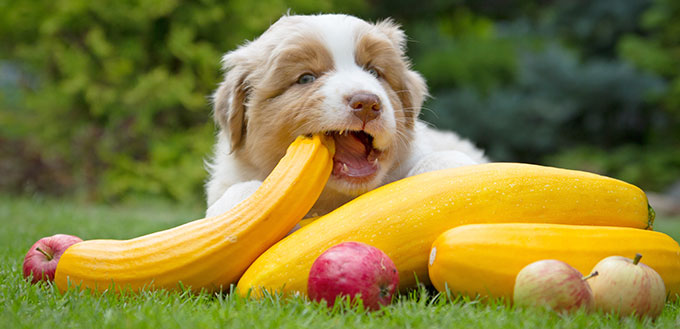
Fruits Dogs Can’t Eat
There are quite a few fruits that have pips, seeds, pits, and kernels that are poisonous when eaten. Not only for pups but for humans as well. You’ll find it most often with fleshy fruit like mangos, apricots, and cherries. If your dog eats a toxic pit or kernel then they run the risk of severe stomach problems, kidney issues, cell damage, or even death if left untreated. Therefore it is vitally important that you avoid feeding the whole fruit to your dog and ensure that you remove the poisonous fruit pits before using the flesh.
Grapes
Grapes and raisins have proved to be highly toxic for all dogs.
It is extremely important that you understand the dangers of feeding grapes to your dog. Perhaps one of the more unassuming fruits, your dog could suffer from grape toxicity if allowed to eat this unassuming fruit. Grape toxicity typically leads to the development of acute kidney injury as well as sickness and diarrhea. If left untreated it is possible for a dog to pass away as a result of severe grape toxicity. So always keep grapes and raisins out of reach of your pooch.
Cherries
Cherries are easily among the fruits and vegetables that your dog should not be eating. Whilst the flesh itself is safe for dogs, the pit most certainly is not. Therefore cherries are not worth the risk of feeding to your pooch. The pits of cherries contain cyanide which is highly toxic to dogs and stops your dog’s blood cells from receiving enough oxygen. Cyanide poisoning is extremely dangerous, and so avoiding cherries altogether is definitely the easier option.
Check out our article on Can Dogs Eat Cherries.
Tomatoes
Generally speaking, ripe red tomatoes are not really a problem for dogs. However, the green parts of a tomato plant contains solanine, a toxic substance that can cause sickness, diarrhea, convulsions, stomach pain, and respiratory problems. In more extreme cases dogs can develop cardiac arrhythmias. Therefore, you should be extremely careful about where you keep your tomatoes in the house, as you don’t want your four-legged friend getting told of them.
Avocados
Avocados are not only extremely high in fat, which is not at all beneficial to your dog, but most of an avocado is toxic to canines. The skin, pit, and leaves of avocados contain a toxin known as persin. Persin has a rather unpleasant effects effect on dogs if consumed, resulting in digestive distress, cramps, and vomiting. Additionally, the fatty flesh inside of avocado also contains persin, and whilst the flesh is not as high in the toxin as the rest, it is still no good for dogs.
Plums
Plums are not considered safe for dogs to eat. Along similar lines to that of peaches, apricots, mangos, and cherries, plums have a difficult-to-remove pit that contains cyanide. Don’t will naturally bite down on anything they are eating, even if it is a hard pit, unlike humans who know to avoid it. Therefore they are at a high risk of developing cyanide poisoning if they consume a plum pit. It is also a choking hazard and can cause intestinal obstructions which can trigger further complications.
Grapefruit
Grapefruit trees are the main reason for grapefruits making the no-go list. There is a multitude of toxins in the peel, seeds, skin, and leaves of grapefruit including Limonene, Linalool, and Psoralens. These toxins have the ability to completely throw off your dog’s digestive system, resulting in a myriad of unfortunate symptoms, such as vomiting, bloating, cramps, diarrhea, and general digestive distress. It’s best to avoid this fruit altogether to err on the side of caution.
For more information on this topic, check out our in-depth article here.
Lemons and Limes
Being the most acidic of all of the fruits and vegetables on our list, it seems somewhat obvious that dogs should not consume them. The level of acid in this particular citrus fruit can cause gastrointestinal distress. Additionally, the presence of psoralens in lemons and limes can have severe side effects including neurological issues and even liver failure. Where some people think it is funny to have their dog lick a lemon, it is not worth the pain and discomfort they could experience after.
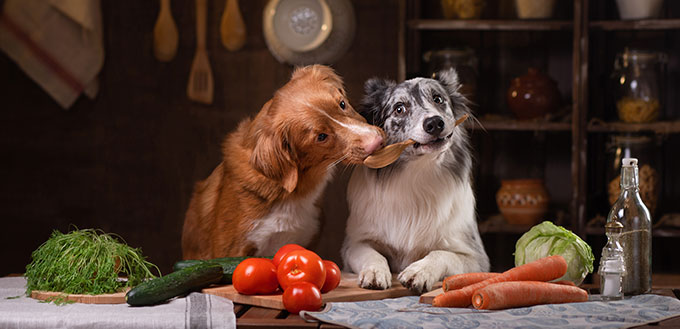
Final Words
Like anything, dogs can react to fruits and veggies just like they can any other foodstuffs (and just like humans can react to peanuts and shellfish). It is your prerogative as their owner to watch how they react to each of the fruits and vegetables as you feed each one to your pup.
That being said, there are so many fruits and vegetables on our list that have a variety of positive effects on your dog’s health that it’s hard to ignore. So exploring your options with your pup can help you to get to grips with what veggies or fruity treats your dog might enjoy. Once you’re familiar with their likes and dislikes you can treat your beloved pooch to sweet and savory fruit and vegetable snacks on a regular basis.
Sources:
- Jasey Kelly, List of Fruits & Vegetables Dogs Can Eat, The Nest
- Dr. Wendy Newell, What Vegetables Can Dogs Eat?, Whole Dog Journal
- Are Veggies Good for My Dog?, WebMD
- People Foods to Avoid Feeding Your Pets, The ASPCA
Note: The advice provided in this post is intended for informational purposes and does not constitute medical advice regarding pets. For an accurate diagnosis of your pet's condition, please make an appointment with your vet.


